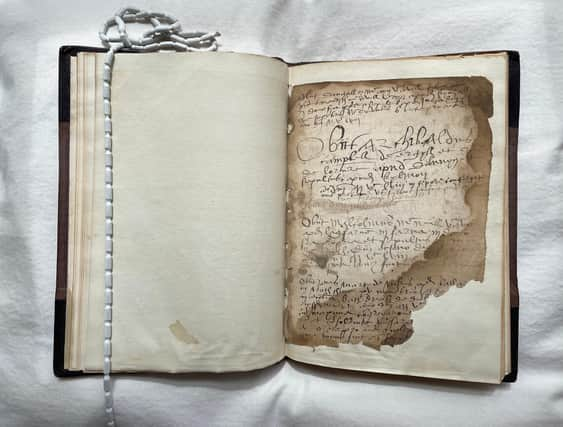16th Century 'treasure' text in Gaelic, Scots and Latin bought for the nation


The National Library of Scotland was successful in securing the Chronicle of Fortingall for £25,000 at auction.
Scribes compiled the manuscript between 1554 and 1579 at Fortingall in Highland Perthshire with the collection of works including reports on contemporary events, poetry and other short texts in a mixture of the three languages.
Advertisement
Hide AdAdvertisement
Hide AdIt is considered of great linguistic importance given the interplay of the written languages in then Gaelic-speaking Scotland
The scribes belonged to the MacGregor family who also compiled the slightly earlier Book of the Dean of Lismore, the earliest surviving collection of Gaelic poetry compiled in Scotland, which is considered a treasure of the library.
The two manuscripts were almost certainly compiled by members of the same family, scholars believed.
Dr Ulrike Hogg, Manuscripts Curator at NLS, said: “We consider the Chronicle of Fortingall a partner volume to the Book of the Dean of Lismore, the Library’s single most important Gaelic manuscript and one of our greatest treasures.
"The two manuscripts are so closely connected that it’s difficult to describe one without reference to the other. It’s a great privilege for us to be able to bring the manuscripts together again after their compilation some 450 years ago.
“The Gaelic contents of the Chronicle of Fortingall make a significant addition to our Scottish Gaelic manuscripts collection, which is the largest in the world.
"And securing the manuscript for the national collections means we can make the contents publicly accessible and ensure its professional preservation.”
Included in its pages are Latin lists of Scots kings and battles, including Bannockburn and Flodden as well as chronicles which record the deaths of prominent men and women in the Highlands between 1390 and 1579.
Advertisement
Hide AdAdvertisement
Hide AdShort prose text in Latin in Scots covers subjects including the divisions of Ireland to medicine and cures and a commentary against women and drunkenness.
Works by Robert Henryson and William Dunbar, makars who wrote in Middle Scots in the mid 15th Century, also feature.
Dr Martin MacGregor, Senior Lecturer in Scottish History at the University of Glasgow, welcomed the acquisition.
He said: “It is a relief that the National Library was successful in securing the Chronicle of Fortingall, especially as they hold the companion volume, the Book of the Dean of Lismore.
“The Chronicle of Fortingall is a highly significant manuscript which provides insight into public life in the Highlands in the later Middle Ages. It is an important source for the history of the Highlands – social, political, cultural, economic and religious.
"It also has great linguistic importance as it embodies the interplay of Latin, Scots and Gaelic as written languages in then Gaelic-speaking Scotland.”
The sister manuscript of The Book of the Dean of Lismore was compiled by James MacGregor (circa 1480-1551), Dean of Lismore and notary public working in Fortingall.
It contains mostly Gaelic poetry but also includes a mix of content in Scots, Latin and English.
Advertisement
Hide AdAdvertisement
Hide AdThe poems are said to have been taken down from the repertoire of 'strolling bards', and are now a main source for early Gaelic poetry.
